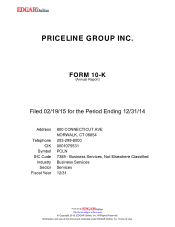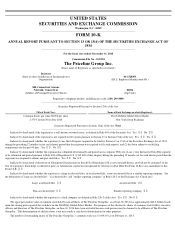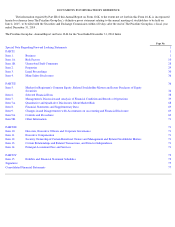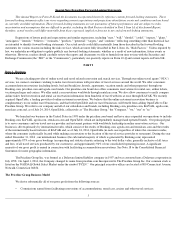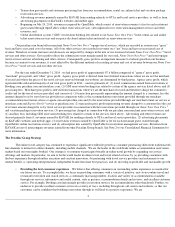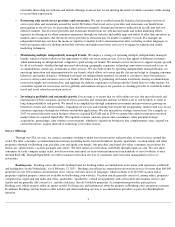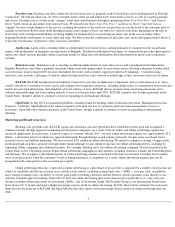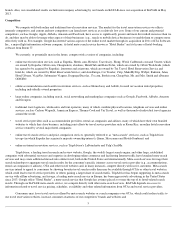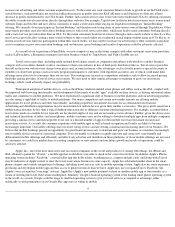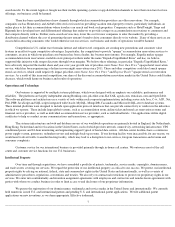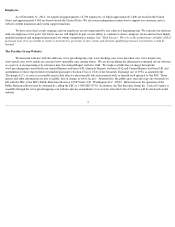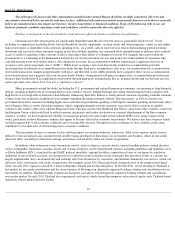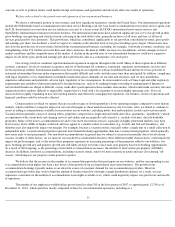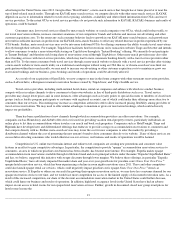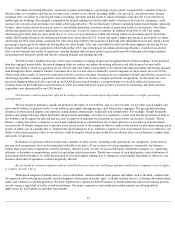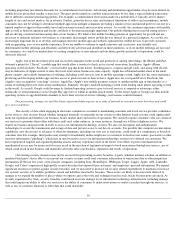Priceline 2014 Annual Report Download - page 10
Download and view the complete annual report
Please find page 10 of the 2014 Priceline annual report below. You can navigate through the pages in the report by either clicking on the pages listed below, or by using the keyword search tool below to find specific information within the annual report.
increase our advertising and other customer acquisition costs. To the extent any such consumer behavior leads to growth in our KAYAK meta-
search business, such growth may not result in sufficient increases in profits from our KAYAK meta-search business to offset any related
decrease in profits experienced by our OTA brands. Further, meta-
search services may evolve into more traditional OTAs by offering consumers
the ability to make travel reservations directly through their websites. For example, TripAdvisor facilitates hotel reservations on its transactional
websites Tingo and Jetsetter and now allows consumers to make a reservation while staying on TripAdvisor through its "Instant Booking"
offering. We currently do not participate in "Instant Booking" and therefore risk losing share of reservations sourced through TripAdvisor. Other
meta-search providers may also offer direct booking services with travel service providers, which may lead to more consumers booking directly
with a travel service provider rather than an OTA. To the extent consumers book travel services through a meta-search website or directly with a
travel service provider after visiting a meta-search website or meta-search utility on a traditional search engine without using an OTA like us, or
if meta-search services limit our participation within their search results, we may need to increase our advertising or other customer acquisition
costs to maintain or grow our reservation bookings and our business, gross bookings and results of operations could be adversely affected.
As a result of our acquisition of OpenTable, we now compete or may in the future compete with other restaurant reservation providers,
such as LaFourchette, a European restaurant reservation business owned by TripAdvisor, and Yelp's SeatMe service.
Travel service providers, including multi-national hotel chains, rental car companies and airlines with which we conduct business,
compete with us in online channels to drive consumers to their own websites in lieu of third-party distributors like us. Travel service providers
that sell on their own websites may charge lower prices and, in some instances, offer advantages such as loyalty points or special discounts to
members of closed user groups (such as loyalty program participants or customers with registered accounts), any of which could make their
offerings more attractive to consumers than our services. Discounting may increase as competition authorities seek to allow increased pricing
flexibility among providers of travel service reservations. We may need to offer similar advantages to maintain or grow our reservation
bookings, which could adversely impact our profitability.
Widespread adoption of mobile devices, such as the iPhone, Android-enabled smart phones and tablets such as the iPad, coupled with
the improved web browsing functionality and development of thousands of useful "apps" available on these devices, is driving substantial online
traffic and commerce to mobile platforms. We have experienced a significant shift of business to mobile platforms and our advertising partners
are also seeing a rapid shift of traffic to mobile platforms. Our major competitors and certain new market entrants are offering mobile
applications for travel products and other functionality, including proprietary last-minute discounts for accommodation reservations.
Advertising and distribution opportunities may be more limited on mobile devices given their smaller screen sizes. The gross profit earned on a
mobile transaction may be less than a typical desktop transaction due to different consumer purchasing patterns. For example, accommodation
reservations made on a mobile device typically are for shorter lengths of stay and are not made as far in advance. Further, given the device sizes
and technical limitations of tablets and smart phones, mobile consumers may not be willing to download multiple apps from multiple companies
providing a similar service and instead prefer to use one or a limited number of apps for their mobile travel and restaurant research and
reservation activity. As a result, the consumer experience with mobile apps as well as brand recognition and loyalty are likely to become
increasingly important. Our mobile offerings have received strong reviews and are driving a material and increasing share of our business. We
believe that mobile bookings present an opportunity for growth and are necessary to maintain and grow our business as consumers increasingly
turn to mobile devices instead of a personal computer. If we are unable to continue to rapidly innovate and create new, user-friendly and
differentiated mobile offerings and efficiently and effectively advertise and distribute on these platforms, or if our mobile offerings are not used
by consumers, we could lose market share to existing competitors or new entrants and our future growth and results of operations could be
adversely affected.
Apple, Inc., one of the most innovative and successful companies in the world and producer of, among other things, the iPhone and
iPad, obtained a patent for "iTravel," a mobile app that would allow a traveler to check in for a travel reservation. In addition, Apple's iPhone
operating system includes "Passbook," a virtual wallet app that holds tickets, boarding passes, coupons and gift cards, and along with iTravel,
may be indicative of Apple's intent to enter the travel reservations business in some capacity. Apple has substantial market share in the smart
phone category and controls integration of offerings, including travel services, into its mobile operating system. Apple also has more experience
producing and developing mobile apps and has access to greater resources than we have. Apple may use or expand iTravel, Passbook, Siri
(Apple's voice recognition "concierge" service), Apple Pay (Apple's new mobile payment system) or another mobile app or functionality as a
means of entering the travel reservations marketplace. Similarly, Google's Android operating system is the leading smart phone operating system
in the world. As a result, Google could leverage its Android operating system to give its travel services a competitive advantage, either
technically or with prominence on its Google Play app store or within its mobile
6

